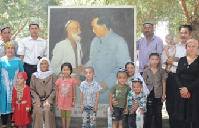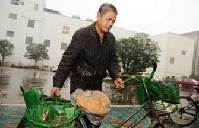'Clothesline' shock leads to meteorology career
Meteorological authorities invited Meng to a discussion on the event, since she is an expert in the field.
It was mentioned at the meeting that there might have been a tornado during the storm but there wasn't enough evidence to confirm this.
That was when Meng determined to make it clear whether it was a tornado or not.
"A tornado had never been documented in Beijing before. I was very curious about what on earth caused the severe wind damage that killed two people in the Tongzhou district," Meng says.
| Mao's legacy lives on |
"I did a couple of storm chases in the United States and was fascinated with tornadoes."
Photos showed trees seeming to fall in different directions. Witnesses also claimed to have seen funnel clouds.
Meng visited the storm-struck suburb in Tongzhou district with her students to gather evidence.
They found that the damaged area was narrow and long, and trees actually fell toward each other in quite a few places, which is strong evidence of a tornado.
It became the first tornado ever documented in Beijing.
Meng credits her achievements to her curiosity about nature, which was first raised by a potentially fatal accident when she was 7.
In 1976, shortly after the major earthquake in Tangshan, Hebei province, Meng accidentally picked up a "clothesline" from the ground, only to get an electronic shock.
A relative rescued her. It turned out the "clothesline" was an electrical wire.
"I was very curious as to why something like a clothesline had such great power to knock me down," Meng says.
"I became fascinated with science and followed my interests to become who I am now."
At the China Young Women in Science Fellowships award ceremony, China Association for Science and Technology executive vice-president Shen Weichen said the percentage of women working at high academic levels is very low, although an ever-increasing number of women, particularly young women, are committing themselves to science and achieving impressive results.
He hopes there will be more women scientists.
"I think the key is life-work balance," says Meng, who has a happy family of three.
"It is not like an all or nothing choice. We can achieve whatever we want - but only if we want to."


















